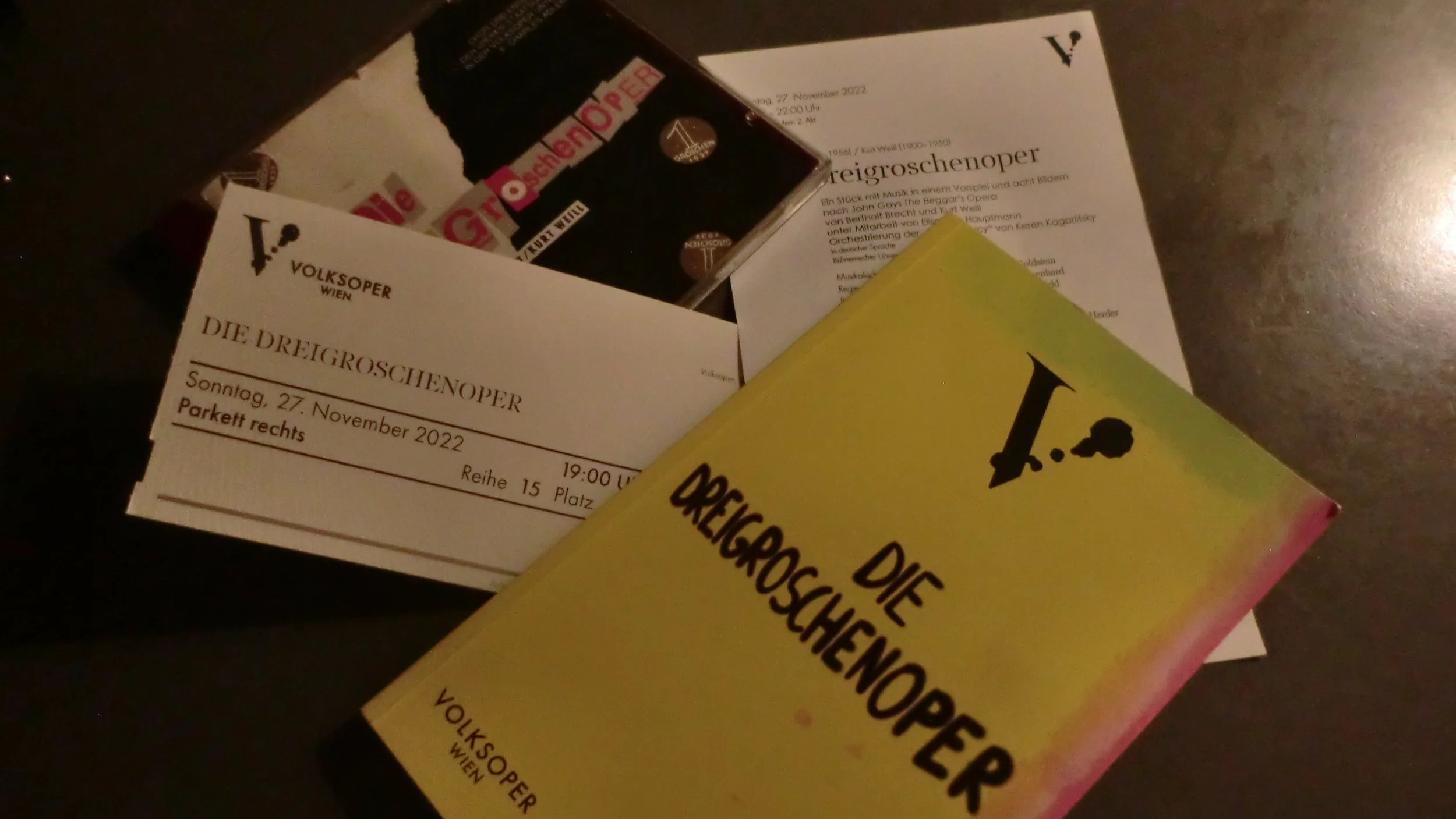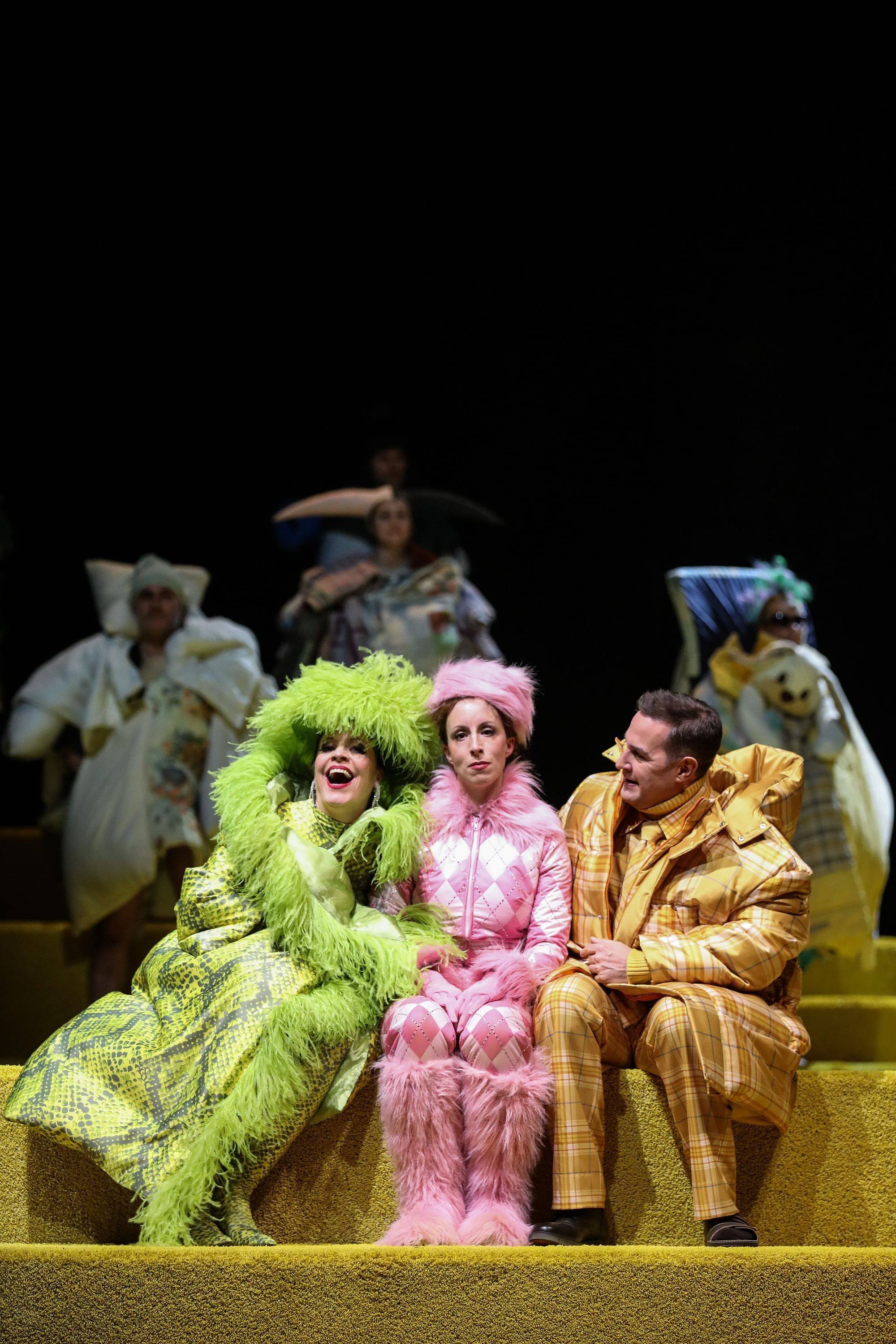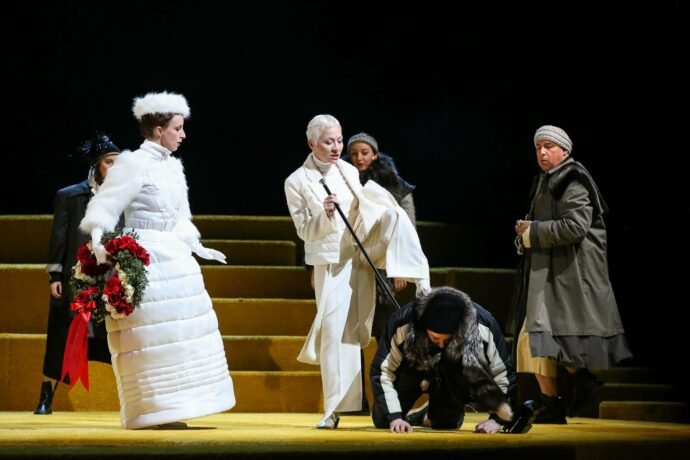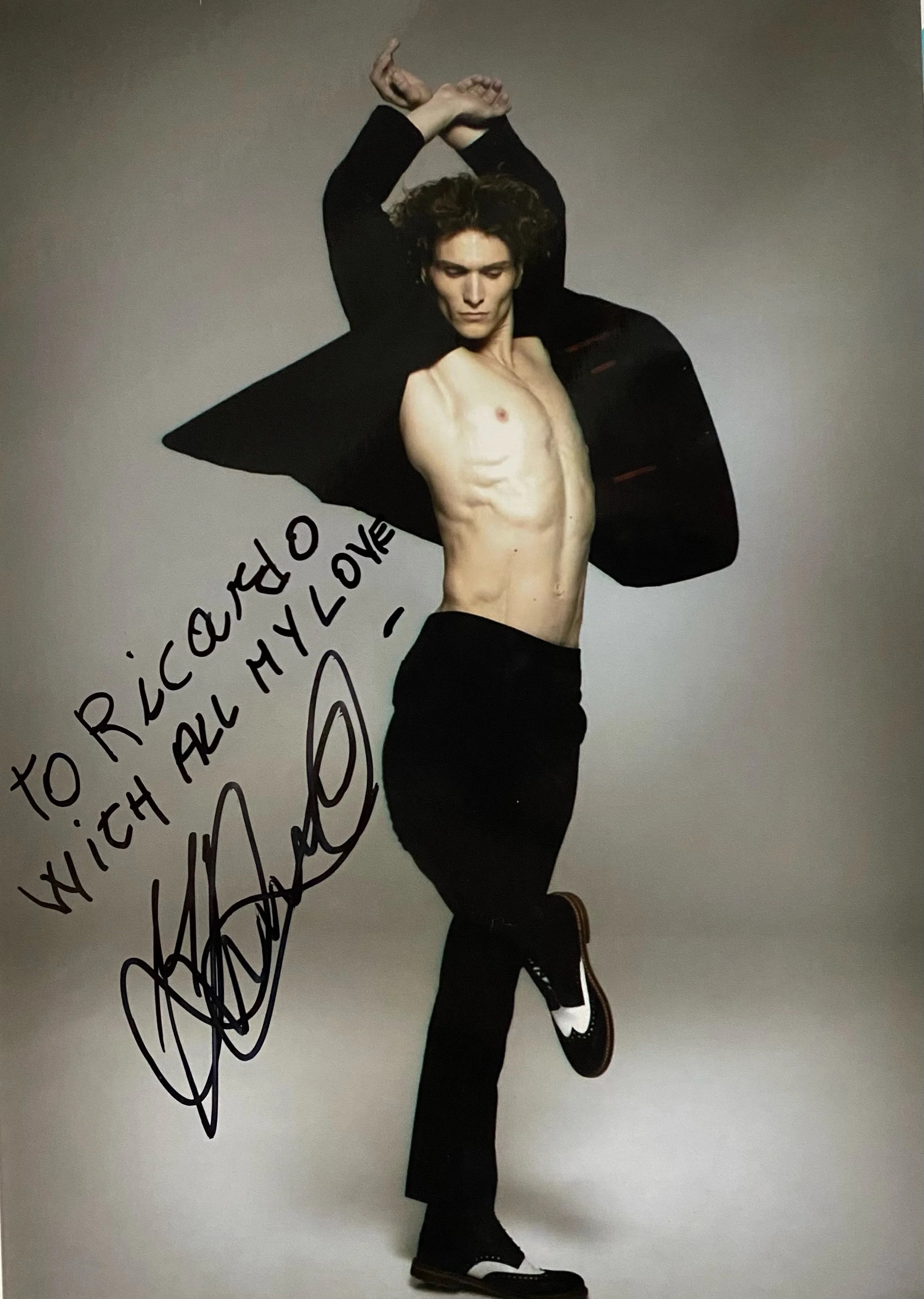The Threepenny Opera (Die Dreigroschenoper): Première, Volksoper, Vienna, November 27th, 2022.
According to both authors, this should be a „play with music", not an „Opera with Dialogue".
My connection to Bertolt Brecht & Kurt Weill began quite early in my adolescence. Both are greatly admired in South America (perhaps even more than in Europe) and my first contacts with their work were not only from the audience but also at Theatre School. Nevertheless „the" special „landmark" in my life that brought me truly to admire this most aggressive (and daring) work, was an old LP that my parents used to play at home: Die Dreigroschenoper with Kurt Preger (Macheath), brilliant Liane Augustin (Polly), Hedy Fassler (as the most debauched „Spelunkenjenny"/ Honky-Tonk Jenny, I have ever heard), Anny Felbermayer (a very screechy Lucy) and Rosette Anday and Alfred Jerger (Mrs & Mr Peachum). These names are nowadays not very known anymore but they were during the difficult after-war years – I wonder how it must have felt to have been in a work that „foresaw" the „Beefsteak-Tartar" as mentioned during the „Kanonensong" (Cannon Song). And perhaps you may have guessed: those were very well-known names in Vienna and, guess what, this is a recording from the same Volksoper as yesterday, but from 1955. Nearly 70 years ago. This precious recording is perhaps the best one ever made (Although I must admit that Nina Hagen's „Mrs Peachum" some years ago was incredibly strong).
Yesterday's première was a very entertaining one – for those who haven't occupied themselves with Brecht and Weill - and the audience seemed to like it.
Copyright: Barbara Pálffy /Volksoper Vienna
No question that the staging was brilliant and resembles a precise choreography (even with the use of the endlessly used and predictable revolving stage), the costumes by Christina Geiger very inventive, but is this what we were looking for yesterday in a Brecht & Weill play? The musical direction by Carlo Goldstein, although missing somehow the „Weill emphasis" on the wind instruments, was good (The original orchestration included brass and woodwind players, banjo, timbal, percussion instruments, Harmonium, and Piano).
Maurice Lenhard's direction is not what could be described as loyal to the original, sometimes even bordering comedy (!?!?). A complete lack of understanding for the play and its essence. Let's face the fact that this „version" of John Gay's „The Beggar's Opera", which was created nearly 200 years before, was made because of the same circumstances that were happening in Germany in the 1920s: Social abuse („Erst kommt das Fressen, dann kommt die Moral"), Oppression, Injustice, Socially and politically critical observations... you know the rest. One should not forget history and the idealism that moved Brecht to this work. This is conditio sine qua non for a clear, objective understanding of this most complex work.
Copyright: Barbara Pálffy / Volksoper Vienna
One aspect is one of the most disappointing ones of the whole production. The complete oblivion of the very known Brecht's „rule of three" (very present also in his play „Herr Puntilla" and many times copied by Charles Chaplin in his early films, especially in „City Lights"). Early in the evening, while Polly was singing „Seeräuberjenny" (Pirate Jenny) there was no dramatic „weight" on the content of a story that should be told in three parts. And which, by the way, are expected to be a „play within the play" – yesterday's performance used spotlights to suggest this „staging" – but if the actor – in this case, Johanna Arrouas - does not play accordingly, no props will be ever able to help.
The same happened to another Polly song, also sung by Miss Arrouas, the Barbara-Song (about the suitors with their clean collars). There was absolutely no underline in the words „Nein" and „Nicht" (No and Not), a requirement to tell the story and bring the surprise of the third part in which these words are not used („Ja, da muss sich doch einfach hinlegen... „)
Weill's „new sound" combined not only some „popularity" (banality vs. Artistry) with aggressive Jazz, but also Song melodies, and romantic sentiment (nearly bordering a schmalzy outcome) that completely accentuated the theatrical impact of the play. This brings me to the other disappointing aspect of the evening. The „Threepenny music" is not supposed to be operatic but „basic song singing" (with the flexibility that the singers should have in also using more of a chest voice. It is not I who is making this up, Kurt Weill thought that "It is not about a text being sung but about strongly accentuated declamation, that should be placed more or less on the „wished for" key". And this is the key to the “intimacy” between singer and audience. Think of all Brecht & Weill-Lieder and if you can, search once the ultimate interpretation of their songs by Catherine Sauvage - yes, in French, but the essence of their story-telling is there. Presentness at its best.
Ursula Pfitzner „stole the show" as Mrs Peachum (even if directed to be kind of “naughty”, a quality which is not, in fact, Mrs Peachum’s) and Carsten Süss as an imposing, somehow cynical Mr Peachum with his strong stage presence, were throughout the play „reassuring company" to keep the show on the right track. Johanna Arrouas gave us quite a „bumpy" not linearly understandable performance of Polly. Marco di Sapia gave a brilliant reading of „Tiger" Brown. His appearance, clear voice, and singularly precise pronunciation caught the audience’s full attention. Julia Koci failed to get the particular screeches of the character (Lucy) but gave most of the time a consistent show.
Oliver Liebl, was directed into „singing" („Zuhälterbalade"/ Tango Bald and, especially the „Solomon Song", that turned to sound more like a Andrew Lloyd Weber’s musical piece!) instead of using the more effective (and originally foreseen) technique of „Sprechgesang" for both pieces.
Copyright: Barbara Pálffy / Volksoper Vienna
Sona MacDonald, a good and strong actress, seemed uneasy as Macheath. Her right hand, constantly in her pocket, was testimony enough to reveal insecurity and denounce her uncertainty in playing the masculine role. There was simply no chemistry between Macheath and Polly, Jenny and Lucy. Her casting was unconvincing. Macheath is simply not a „Hosenrolle".
And isn’t it quite strange that everyone was talking during intermission more about the gender issue than about the reasons why this play was first produced? Think about that.
My two last points are simple and quite simple to understand.
First of all, I think that also some more care should be given to the written programmes (I still believe and want to believe that a younger generation could learn from them): Brecht's first name was written in two different forms just some pages apart from each other: Bertholt and Berthold. Both wrong. His name was Bertolt.
The second point has been bothering me for quite some time but it crystalized in my mind while writing this critique (and listening to my old Threepenny Record as a form of inspiration): Some actors are sounding now very “German”. But sometimes even colloquially – just to fall back on words that are accentuated as if they were being spoken in Austrian dialect, making one realize that this is just, pardon me the expression, “phony”. I am not asking for a „Burgtheater Deutsch" (That used to exist in a long-forgotten pre-Claus Peymann, German era) but for Austrian High German. To hear the word „Kai" on stage yesterday and today on the recording, made all the difference!
As previously mentioned, definitely an entertaining production – if one does not care about such details. A beautiful production. Not even superficially “Brecht”. But beautiful.
Ricardo Leitner
November 28th, 2022.








